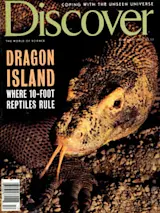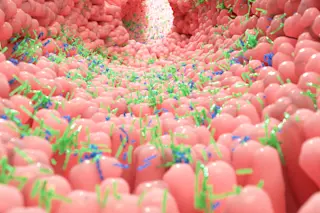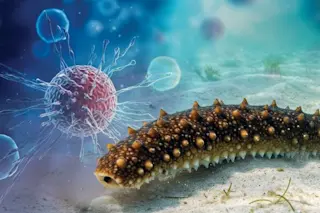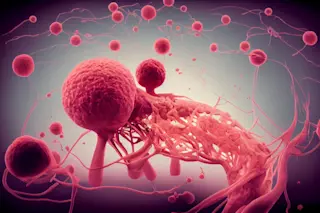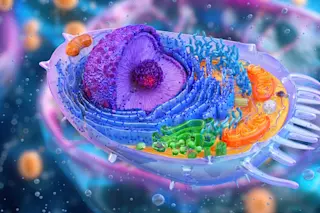Henrietta Lacks achieved a kind of immortality on February 9, 1951. On that day a sample of cancerous cells from her cervix was transferred to a culture dish, doused with nutrients, and left to grow. Lacks, a 30-year-old mother of four from Baltimore, had one of the most aggressive cervical cancers her doctors had ever seen, and the cells culled from her tumor grew avidly, doubling their number each day. Then they escaped. Small spills are always happening in laboratories; what distinguished Lacks’s cells was their ability to survive after they were somehow spilled. They were so hardy that if just one of them fell on a petri dish it would outgrow and overwhelm anything else living on that dish within a month.
Soon Henrietta Lacks’s cells were traveling from lab to lab, either deliberately sent--many cancer researchers had taken to using them in their experiments--or as an unseen contaminant tagging along in another cell line. Some researchers who thought they were looking at something completely different--a line of liver cells, say--ended up studying Henrietta Lacks’s cervical cells by accident. The cells even slipped through the iron curtain and into Russia.
Lacks died in October 1951, but her peripatetic cells lived on. Now some biologists are saying that those cells, called HeLa cells for short, have lost more than their connection to Henrietta Lacks. HeLa cells, these researchers claim, are no longer human at all: they are single-celled microbes--closely related to us, to be sure, but their own distinct species.
How so, you ask? HeLa cells are not connected in any way to people, explains evolutionary biologist Leigh Van Valen of the University of Chicago. They have an extremely different ecological niche from us. They don’t mate with humans; they probably don’t even mate with human cells. They act just like a normal microbial species. They are evolving separately from us, and having a separate evolution is really what a species is all about.
The process of evolution is much the same for HeLas as it is for humans, although the former usually reproduce asexually, by cell division. As the cells divide, genetic mutations inevitably occur, and the ones that make the cells better adapted to their ecological niche--the petri dish-- are preserved by natural selection. When Henrietta Lacks’s cells first became cancerous, they also acquired the ability to survive indefinitely in a culture medium; that massive genetic transformation made them substantially different from ordinary human cells, and after four decades of evolution they have become more different still. Different strains of HeLa cells, analogous to different races of human beings, have even developed in some of the geographically separated lines.
These little unicellular organisms have crossed oceans, spread their range, got into other cultures and outcompeted them, says Richard Strathmann, a marine biologist at the University of Washington’s Friday Harbor Laboratories who dabbles in evolutionary theory. They’re only different from other single-celled organisms in that a human being gave rise to them.
Strathmann and Van Valen (the latter with his colleague Virginia Maiorana) put forth these ideas separately, in two papers in the same issue of the journal Evolutionary Theory, which Van Valen edits. (Both papers, he points out, were independently reviewed before publication.) Van Valen and Maiorana not only declared that HeLa may not be Homo sapiens, they gave the new species a name: Helacyton gartleri--Hela, after the HeLa cells themselves; cyton, from the Greek cytos, meaning cavity or cell; and gartleri after geneticist Stanley Gartler, who was the first to document the cells’ remarkable success.
While Van Valen is willing to name the new species, he is unwilling to suggest which higher taxonomic category it might fall into. Beyond the family name there are problems, he says. Since a HeLa cell can’t survive outside a culture medium, it obviously isn’t a primate in the usual sense. At the same time, says Van Valen, you can’t call it a protist- -a member of the kingdom of all single-celled organisms, which includes bacteria, protozoans, algae, and fungi--since that would mean that the same group had evolved twice, once sometime before 3.5 billion years ago and again today. It’s a fundamental tenet of evolutionary theory that evolution doesn’t repeat itself.
But that’s exactly what has happened, says Strathmann. And to him, HeLa cells are just a particularly aggressive and successful example of an evolutionary transition that has happened numerous times recently. Many cancer cells, in becoming cancerous, undergo the same type of genetic transformation that Henrietta Lacks’s cells did and thereby acquire the potential to be immortal; and many different lines of these cells are now surviving in petri dishes all over the world. All of them, according to Strathmann, have made the huge evolutionary leap from being metazoans-- multicellular creatures with organs and tissues--to being single-celled protists. What’s most amazing, he says, is how fast they did it: it took nearly 3 billion years for the first metazoans to evolve after life originated but just a handful of years for HeLa and other cell lines to take exactly the same step in the other direction.
If this modern-day transition from human being to unicellular blob sounds like far-out fiction to you, you’re not alone. Some biologists consider the survival of HeLa cells a purely artificial phenomenon and argue that evolution in a petri dish has little relevance to evolution in nature. Indeed, Strathmann’s paper was rejected by other journals for just that reason before Van Valen agreed to publish it along with his own. Van Valen and Strathmann, of course, reject that criticism. The perception is that if human beings are manipulating the situation, it’s not natural, says Strathmann. But biomedical researchers are part of nature.
Organisms live in all sorts of odd places, including ones humans have created, adds Van Valen. Parks and cities are environments that we created, and organisms have become adapted to them. Human beings have even created new species before, albeit not from their own flesh. Modern corn, for instance, is a product of selective breeding by generations of farmers, and like HeLa cells, it can’t survive without human help. If HeLa had not been derived from human tissue, Van Valen says, there would be no question about its being a new species.


